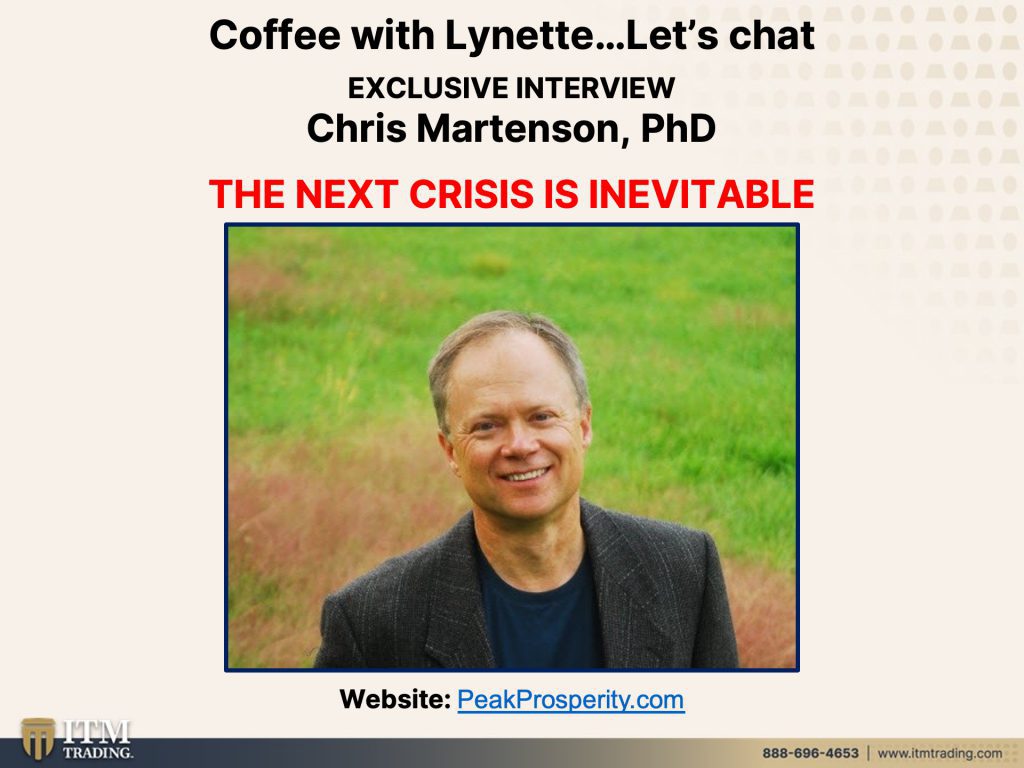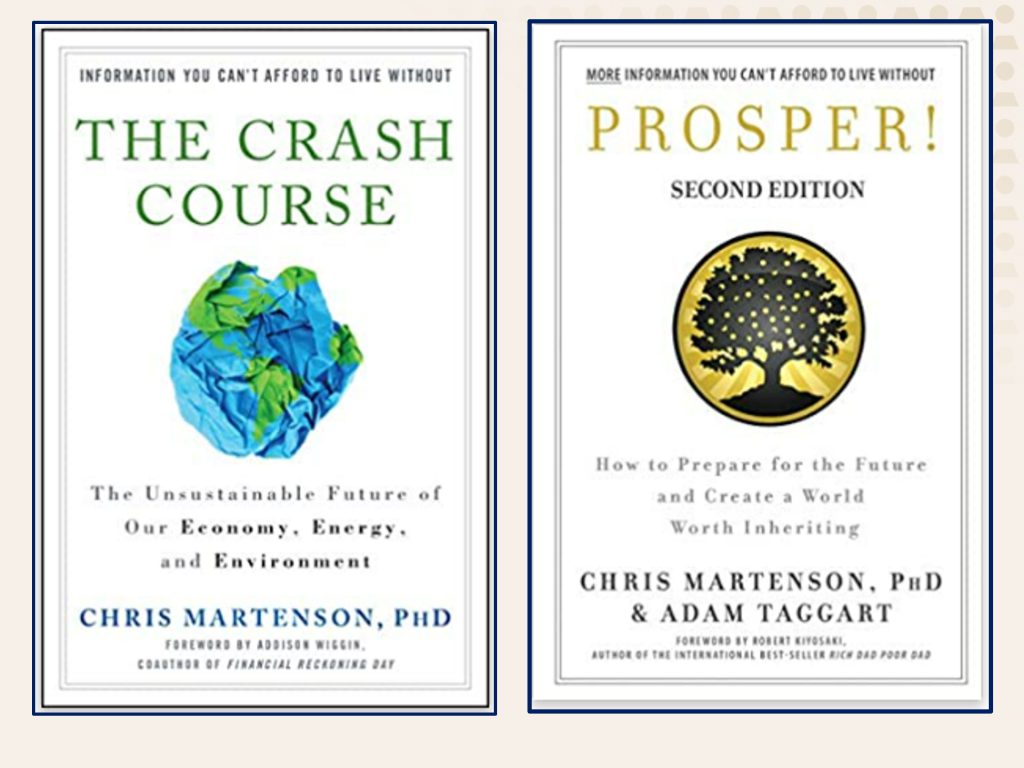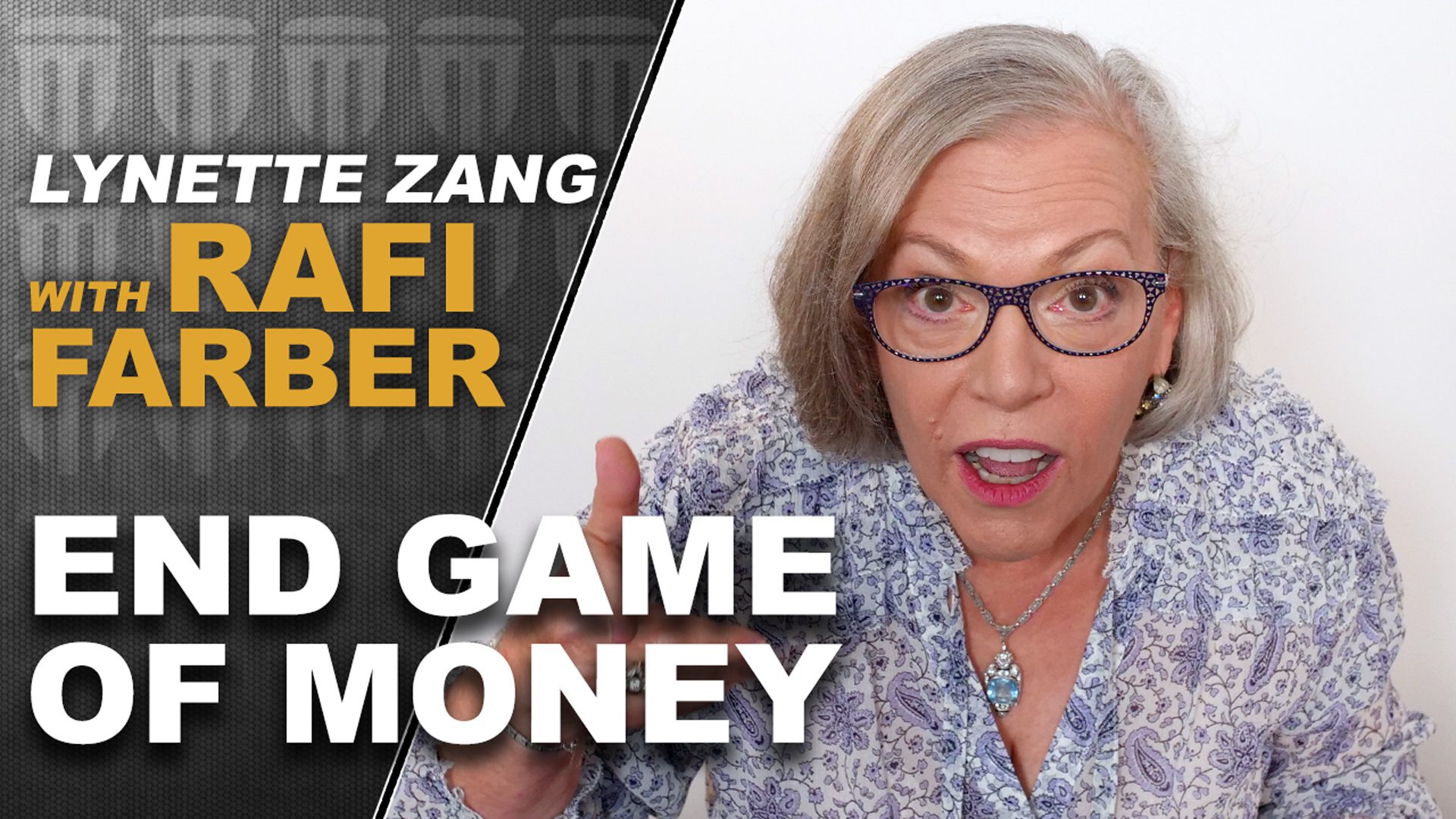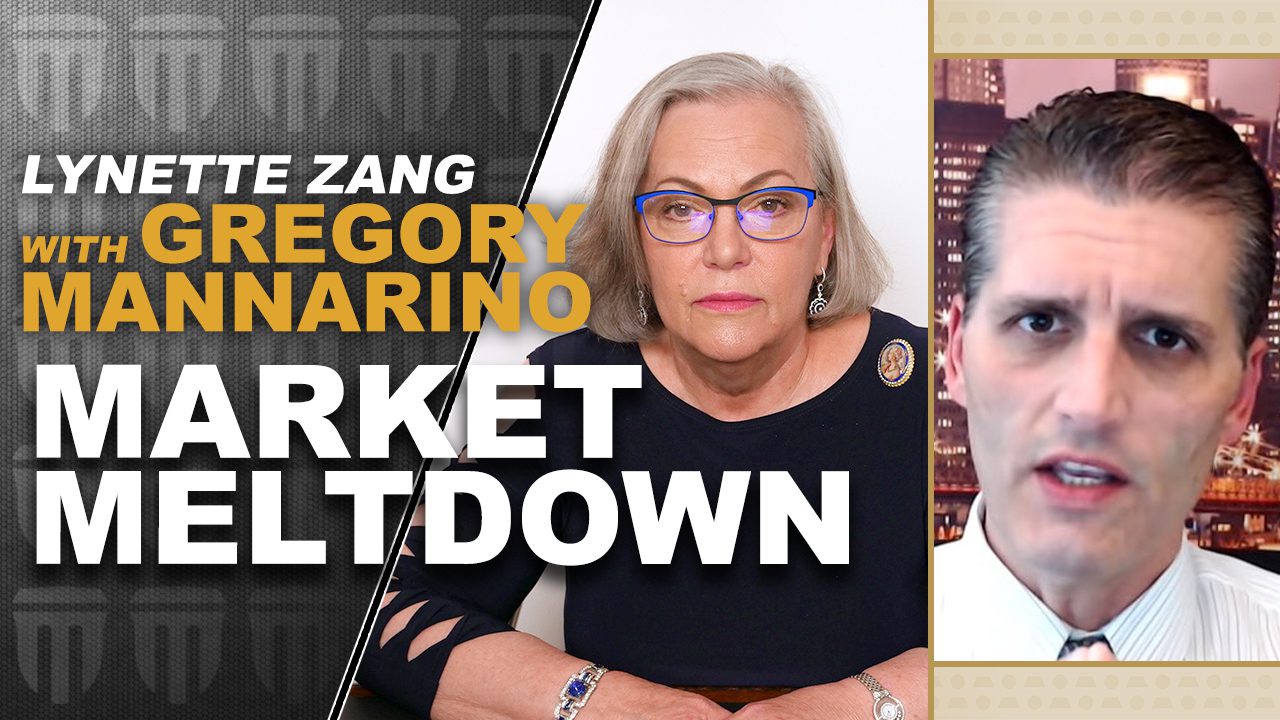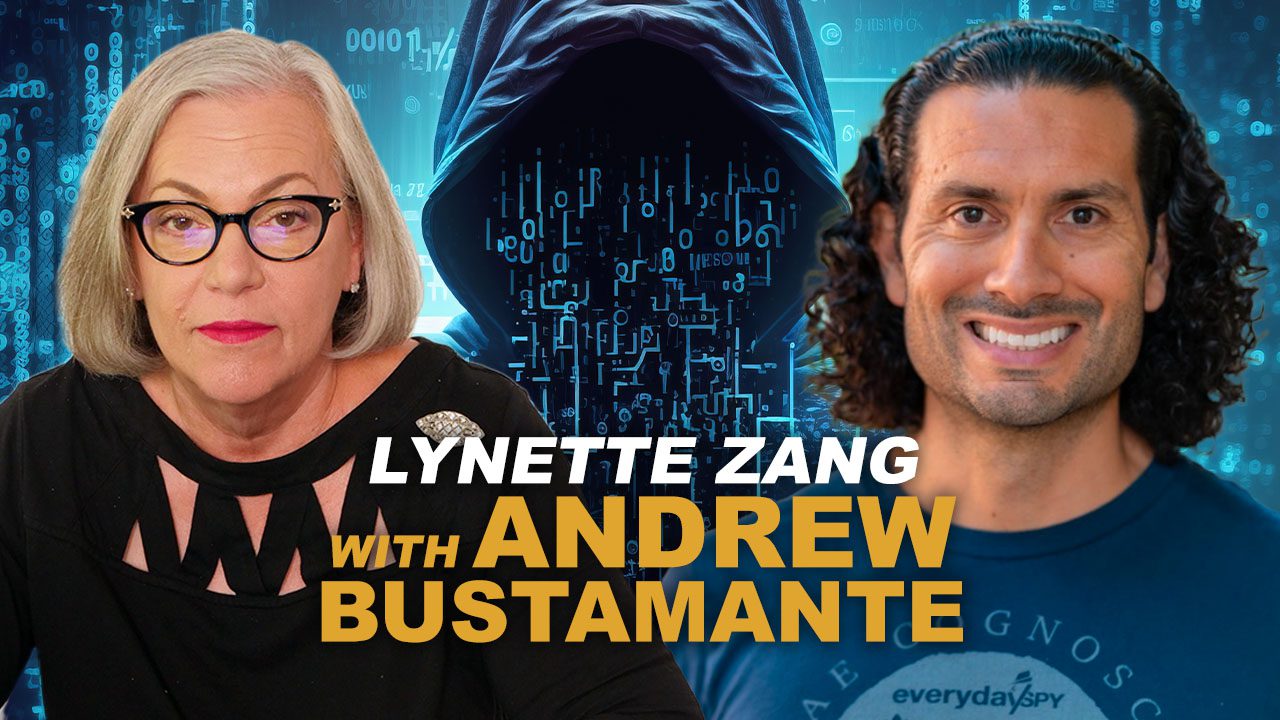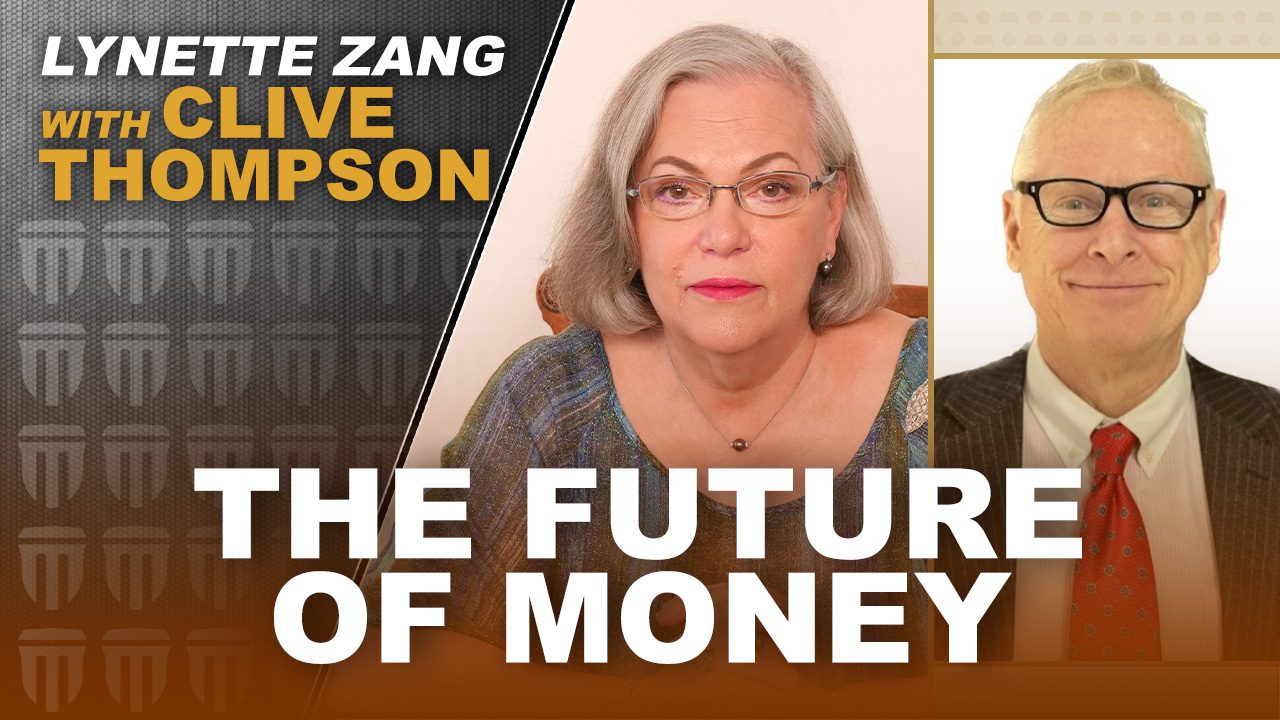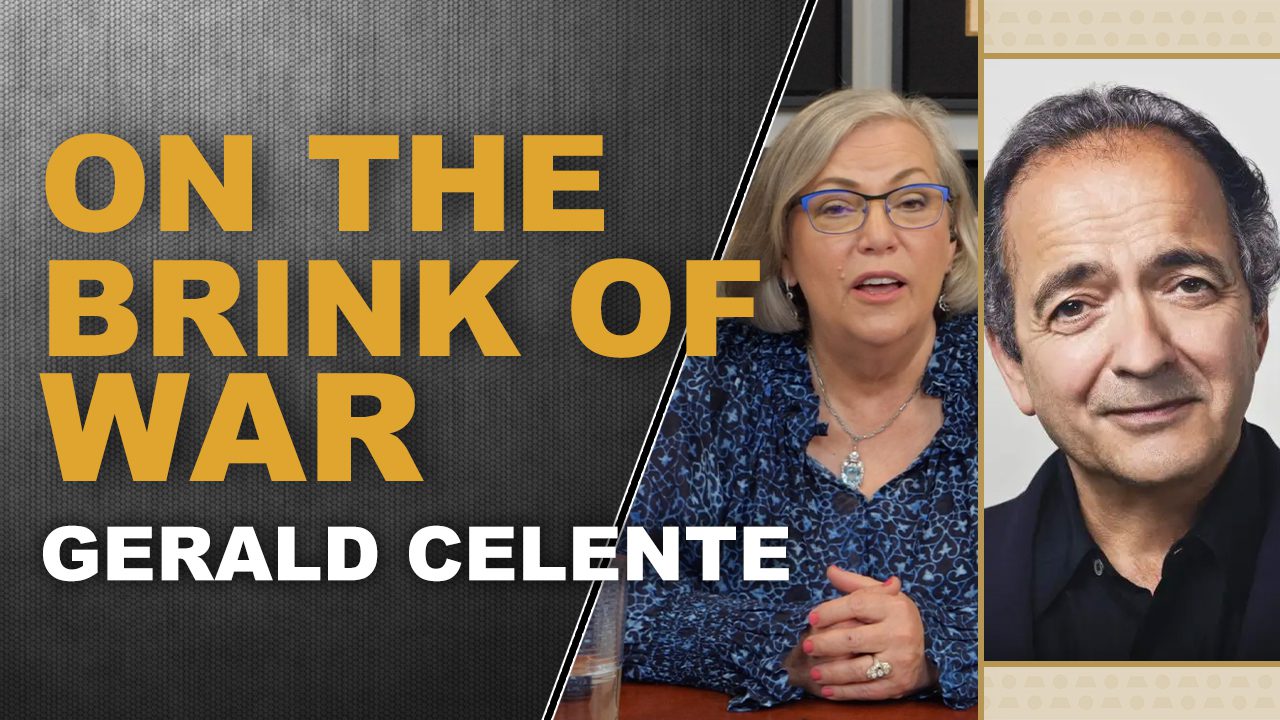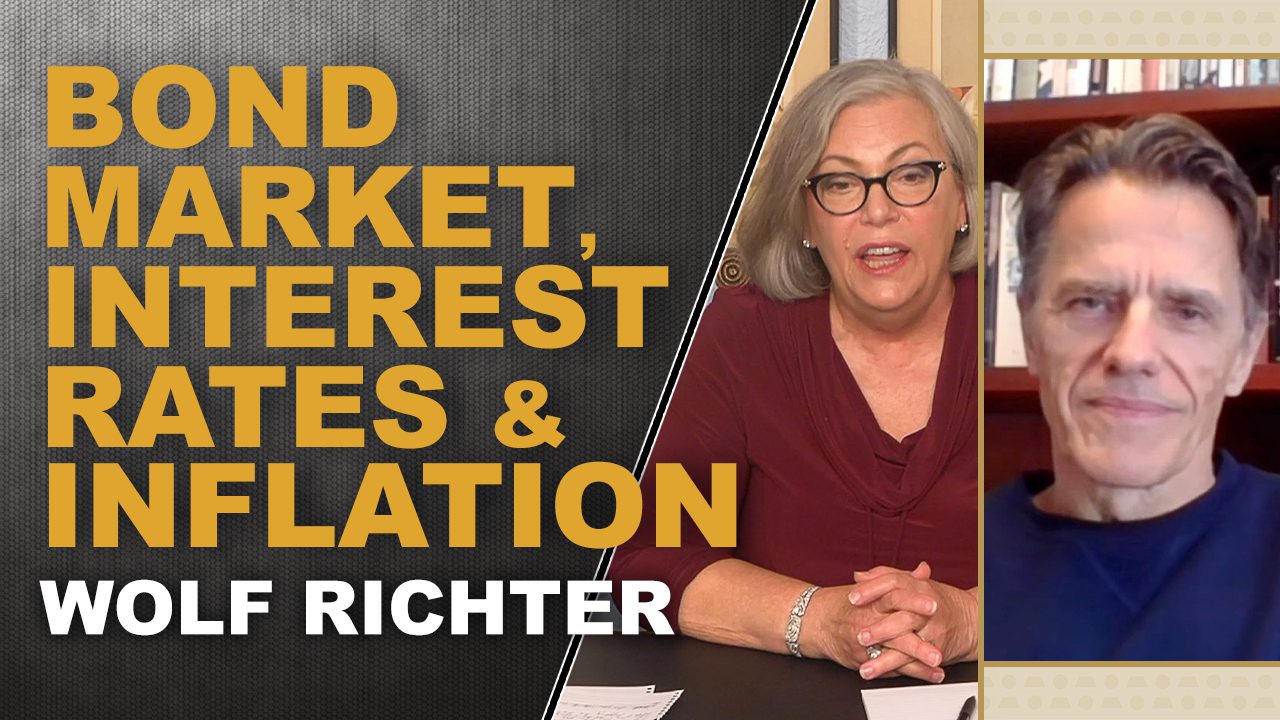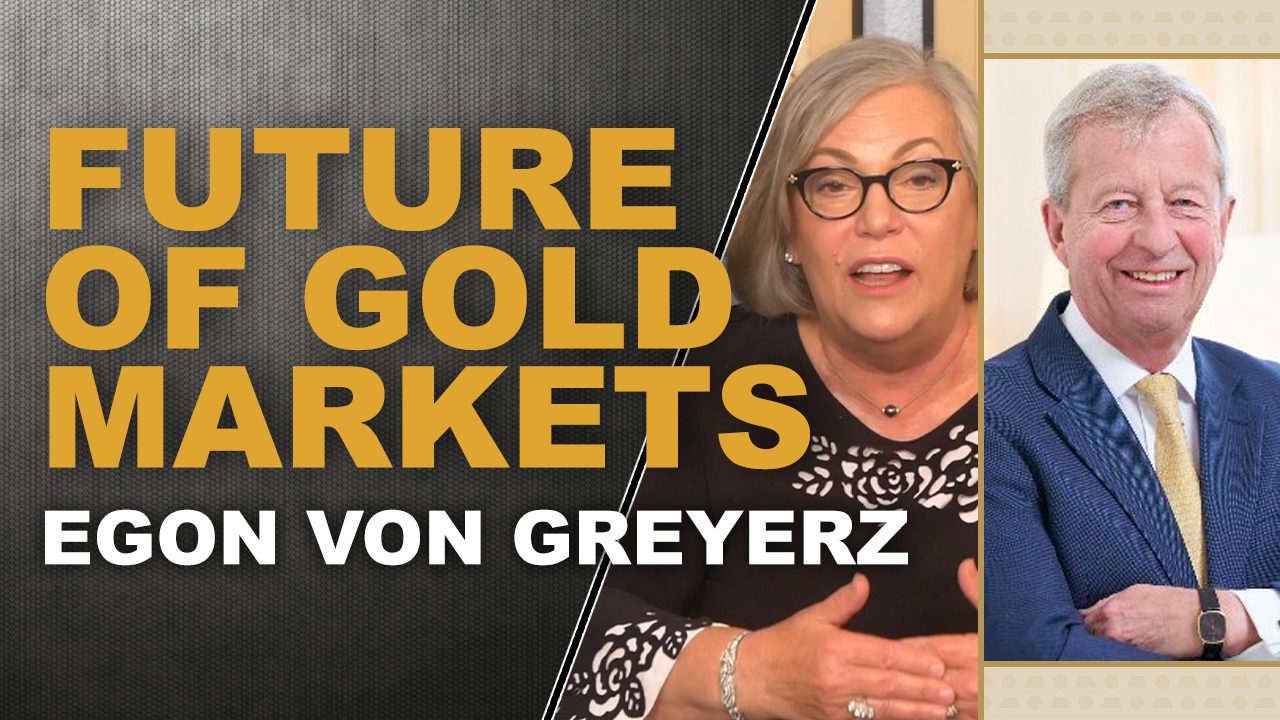THE NEXT CRISIS IS INEVITABLE: A Conversation with Chris Martenson & Lynette Zang
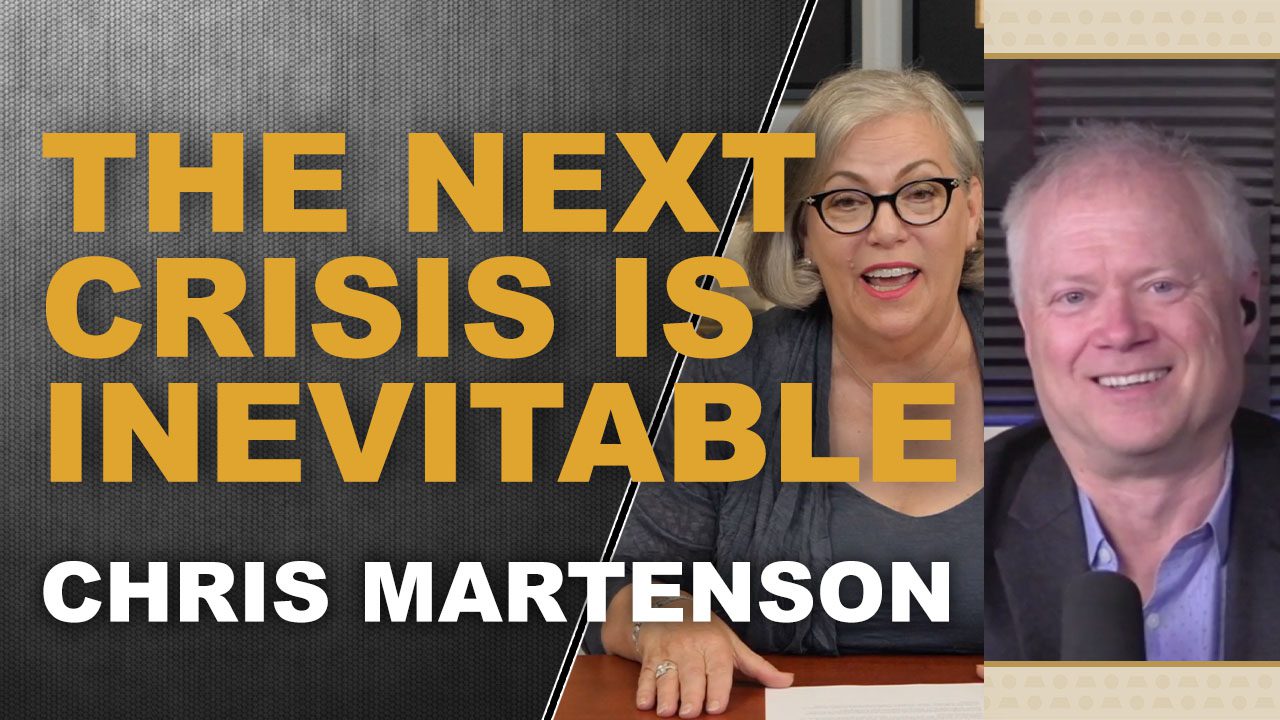
I am so excited to have this very special guest on today. I have been following Chris Martenson’s career in his website since 2006 and I have learned so much from this man. He is brilliant and his incredible video series, The Crash Course, that shows the interconnected forces between the economy, the energy and the environment, what he calls the three E’s.
CHAPTERS:
0:00 Chris Martenson
2:05 Peak Prosperity
5:43 Economy, Energy & Environment
14:00 Inevitability of Central Bank Digital Currencies
18:39 “Banks Win, Everybody Else Loses”
24:40 Inflationary Spiral
28:04 Central Banks Give Up Forward Guidance
34:20 Manipulation of the Gold Market
43:15 Building Resilience
TRANSCRIPT FROM VIDEO:
Lynette Zang (00:00):
I am so excited. I mean, so excited to have this very special guest on today. I have been following his career in his website since maybe, I don’t know, 2006, 2007, maybe even earlier than that. And I have learned so much from this man. He is brilliant and his incredible video series, the crash course that shows the interconnected forces between the economy, the energy and the environment, what he calls the three E’s
Lynette Zang (00:51):
Please allow me to present Chris Martenson, founder of peakprosperity.com. Dr. Martenson has a PhD from Duke University and an MBA from Cornell. He is an economic researcher and futurist specializing in energy and resource depletion. And he actually called, cause I saw him, I heard him, the 2008 financial crisis and he did that years before. We finally met in person at George Gammon’s, June 2022 Rebel Capitalist Live event, but I didn’t really get enough time to talk to him. So now we get to have our one on one and you get to benefit from this conversation. Chris, I’m so excited to have this conversation with you today. Thank you for taking your time to join us.
Lynette Zang (01:44):
Here’s something that you and I have absolutely in common. We changed our entire lifestyle because of all of our research mm-hmm <affirmative> so I would like you to explain to our viewers your, your journey.
Chris Martenson (02:03):
<Laugh> all right. Well I, well
Lynette Zang (02:06):
You, yeah, I mean, not the whole journey, but you know.
Chris Martenson (02:10):
So it all started when I was three. <Laugh>
Lynette Zang (02:13):
Yeah, for me it started at four <laugh>
Chris Martenson (02:16):
<Laugh> Well, no, all, listen, my story is, is fairly here’s what happened? I’m a curious person. So the kindest I can be to myself is I’m here because of enlightened self-interest, but actually what was happening was my portfolios getting shredded in 2000, 2001. Right? So I’ve done everything I’m supposed to got the MBA, got a PhD. I’m a vice president of a company. And I was my broker from Merrill Lynch had me in WorldCom and all this crazy stuff. Right. It just got shredded mm-hmm <affirmative> and then I got a little curious I’m like that was awkward, you know, because I was a genius, you know how it is in a, in a bull market bubble, everybody’s a genius. So everything was going great. And then it all fell apart and, and by the time I sort of figured out what was happening. This is early stage internet, 2000, 2001. Not all, it’s harder to find things, but I gotta tell you it was the summer of 2001. I actually got a copy of the creature from Jekyll island.
Lynette Zang (03:11):
Oh great book.
Chris Martenson (03:12):
You got Griffin’s book. Yeah. And so it finally, I’m like this can’t be true. This can’t be how the banking system creates money. Right. Mm-hmm <affirmative> because I got the MBA. Right. And they teach you how to compete for the ball in the arena, but they never tell you how that arena gets made. And I’m like, this is not that hard to understand how come I’ve never run across this? One thing led to another. And I was having awkward conversations with my broker and I kept getting curious and then I ran across this idea of peak oil and I’m, you know, I’m a very dedicated outdoorsman and I’m old enough to have seen massive degradation in species counts and in the great outdoors. And so I started putting all that together and it took about three years and I quit my job. And about three years of blogging, I finally assembled this thing called the Crash Course, which was what I wanted to find on the internet, which explained how does the money system work? How does it interact with our larger economy? How do those interact with the energy systems and, you know, in terms of resources, in the environment, species, loss, pollution, and waste in, you know, resource that, all that. I just wanted that story. I’m a systems level thinker. I need to see the big picture before I can understand the bottom. And then I like to go to the bottom. I like it all to connect, you know, but I couldn’t find that that view, the economists were speaking their language, the geologists were speaking, everybody was speaking their own specialized language. And I realized we needed to see, I needed to see a more comprehensive picture cause it’s not one of ’em was telling the story right anymore. Yeah, exactly. So that’s how I ended up doing what I was doing. And eventually my, my blog turned into an income and then that became the business of Peak Prosperity and it’s been a wonderful ride cause I get to use what I consider to be my God-given gifts and make money while doing it. So it’s a really good position for me to be in.
Lynette Zang (05:02):
Yeah. I agree with you. And by the way, that crash course is phenomenal. So I can’t imagine that anybody out there hasn’t watched it, but if you haven’t and it’s also in book form now, so you know, there’s really no reason whether you’re on the internet and I definitely do encourage everybody to do that, but you know, you say that the three E’s what is that economy, energy and environment are shaping the future. Can you go into that a little bit more for our viewers so that, you can connect the dots for them please?
Chris Martenson (05:37):
Yeah, I would love to. And of course the crash course is a much longer body of work and you know, people can find the videos for free. There’s a, an accelerated version just like 53 minutes. But the whole thing is about four and a half hours, many, many chapters. And so one of the sets of chapters just talks about the economy. And I can’t talk about the economy without starting with, well, what is money? What is, what do we really mean when we need inflation? What is debt? Actually, wait a minute, hold up. What is wealth, right? What is money supposed to be some, you know, foundational things. And once you come through that, I think now we’re in a position to understand what does it mean when a bank makes a loan and what does it mean that we have a debt based money system? Because that’s something you could put on a little mandala and, and meditate in front of for a long time. Every money system enforces some behaviors, punishes others, debt based money system has a whole bunch of pros, cons wrinkles things. But once you can understand that it’s primary goal, as one thing, it has to constantly grow. Debt based money systems go great and forwards. They really stink up the joint in reverse. Right. They’re either happy or collapsing. They don’t really have like a lot. <Laugh> very good middle ground, you know? And so that’s everything that our bank banking system, federal reserve, I’m sure all your listeners are familiar with. What they’re constantly trying to do is just keep the whole thing growing. Right? Any fifth grader could pull up to him and say, pencil that out for me two or three or five more doublings, which is, you know, the kind of growth we’re talking about. What does that look like? Like where are we in the year? 2100? They can’t go there. They just, all they care about is next quarter this month, you know? And that’s their frame of reference. So I’m like, okay, well where does growth really come from? Honestly, money is this intangible idea that is an agreement and a social contract between people. It’s not real. So it has to, it gains its reality because we put tax laws around it. We put a lot of social convention, but fundamentally it has no value if you can’t buy something with it. Right. So purchasing, what do you mean something well, goods and services, you know? So where do those come from? Well, they don’t just arise magically cause humans are clever. They arise because we have resources that we can fashion into things. You know, as clever as a smartphone is, it’s still a whole collection of resources. And so, well, where are we in that story? And that’s where it gets really awkward because Lynette where at a stage of not U.S. Development, but human species development, where we’re gonna have to come up with some new arrangements, unless unless there’s alien technology at area 51 or something, I don’t know about all the data. I have says there’s only so much oil. I take this at the field by field basis. I study it like, like I’ve got OCD. I talk to all the experts. I call talk to oil companies. I mean, I’m just very curious, cause oil is the master resource. If you have oil you can mine copper or whatever else you want. You can grow corn up to you. But when we look at where we are in this oil story, it’s really clear that we’re that an individual well will have a maximum flow rate. And then it depletes over time and declines. And eh, you know, they go away and collection of Wells, which we would call the field, does the same thing collection of fields in a country does the same thing. It’s a process. So China’s admitted their past peak oil. Russia has admitted their past peak oil. Saudi Arabia just came out and they didn’t use the exact term, but they said, we’re gonna hit a “production capacity limit,” call that white UL. And we’re the only country I think that is still head in the sand, not allowed to talk. This is like a verboten. The EIA won’t mention the words, but we can’t talk about the idea that there is a, some limit to the amount of oil that exists. And, and so without that conversation, if you say, well, if our money system has to grow forever and it really likes growing and that growth comes from resources, but fundamentally energy, really fundamentally oil, is there infinite oil and the answer’s no, the answer’s no.
Lynette Zang (09:39):
Yeah. Anything’s, there’s a finite amount.
Chris Martenson (09:43):
Yeah, of course. And it it’s obvious, but it’s not part of our narrative yet. And so this is really, I take a lot of data, but what I’m doing in the world is fighting the idea that we have a lot of bad narratives there’s stories. We tell ourselves as a culture yeah. That are driving us this way and that way, but they don’t line up with reality, all that well, and the problem with that approach is that eventually reality always catches up with you. And in this story, remember, I dropped the bomb earlier, which is my belief system is that we have a money system that’s either expanding or collapsing. Those are its two states. And so, you know, we’ve ramped it up. We have trillions of strict debt in the United States, liabilities four, five times higher than that underfunded unfunded. We have just a collection of IOU’s that are extraordinary. We haven’t really invested in our infrastructure, which is a form of liability. You know, all that stuff has to be replaced and repaired. And so we’re just sort of skating along as if, you know, somehow Elon will invent a magic electric card and this will all fix itself. And I’m over here jumping up and down gone, please just give me five minutes with a crayon and a pencil and a piece of paper. And I can show you that we have some decisions we’re gonna have to make that are pretty serious. And right now Lynette, Europe is they just got railroaded into this. We’re gonna watch what happens when large modern industrialized economies get starved for energy, Germany, being the poster child for that. But we’re gonna, we get to watch this happen over the next six to eight months. And I think it’s gonna be very instructive for a lot of people. My message is that’s gonna happen here too, cause we’re being just as dumb as they were. So that’s why connect energy and economy. You have to see these two together. And when you do, I think it becomes a little bit more clear what the challenges are and where the opportunities are.
Lynette Zang (11:37):
So do you think that that’s part of the reason why they were really pushing this alternative energy away from the oil, the fossil fuels. And, but of course that narrative has fallen apart, but the ESG, do you think, think that’s why they were pushing it? Because they know we’ve hit peak oil.
Chris Martenson (11:58):
At yeah, they have to. I think they have to. Right. I mean I look, well I have a Comcast connection. I figured this out. Obviously they’ve got better data. They have to know about it. So there is a, there’s a lot of ways we could look at this. So let me, let’s just take one way. Let’s like we have a Rubik’s cube, let’s look at the white face and just say, okay, what, what is this story? There’s a story where you go, well, if I’m them. And I know that, that there isn’t enough oil for everybody, but I like my jets. I like my yachts. I like my privilege in society. Do I tell people that or do I convince them that there’s this existential crisis that’s gonna require them to make, do with a lot less energy, right? Because you watch like, you know, it’s just, it’s listen, I’m not political, but I will pull out certain names, like to get lectured by John Carey about climate change after he steps off his private jet and he’s on his way to one of his six mansions, it just doesn’t sit right. You know, <laugh> yeah. It’s just, it’s just a little awkward, you know? And, and so the actions of team elite in terms of how they talk about climate change and ESG and how hard they’re pushing that and where they choose to apply that first compared to their own actions, it’s a massive Gulf. They don’t, they’re not, they don’t really take it seriously or they don’t believe their own role in it serious, but everybody else is gonna have to do this. And so if you line it up a certain way, it it’s, yeah. This could be seen as an approach to saying, well, we don’t have enough resources, rather not be honest about that. So let’s tell people it’s because we have to be green or something or something. And I think a lot of people detect that. Yeah.
Lynette Zang (13:39):
Well and they, and they yeah. Or something. And the, the technology I was reading, this is on water. And they’re talking about energy management. They’re talking about water management and with the current technology that’s in place, they actually have the ability where if you, as long as it’s installed in your house is to regulate the amount of water and the amount of energy, the amount of resources that you as an individual get to use, which is why I’m personally very happy that I have you know, an off grid property. So they can’t do that. Mm-Hmm <affirmative> but they can certainly do that in my home in Phoenix. Right?
Chris Martenson (14:19):
Yeah. And that level of control, obviously, those are things we saw a lot of, is a consequence of COVID we saw obviously this complete trampling of all sorts of rights, the right to assemble the right to have free speech in certain town, square social media platforms, the right to go to church, the right, to decide for yourself what goes into your body? Pretty fundamental stuff. Right? Yes. And but as a consequence of that, you could feel there was all this movement and push to do a couple other things. And one of them is the central bank digital currencies, the CBDC mm-hmm <affirmative> right. You can just feel it coming right. That there’s the inevitability of that approach, which is gonna be wouldn’t the world be a better place if we could just control everything, everybody. Right? Including how much energy, the temperature of your house, how much energy you are using Lynette. Personally, if we could just dial that, then if we feel like we have an issue, well, we just dial everybody’s consumption down or there we go. Whatever the story is. Yeah. Yeah. It’s, it’s, it’s the oldest story in the book. It’s totalitarianism, but we’re just gonna do it better this time, this time. Yeah. <Laugh> we’ve got, we’ve got AI, you know.
Lynette Zang (15:26):
Oh, that’s so much better
Chris Martenson (15:26):
The Soviet crop reports. We can do it this time, but, but what they don’t understand, and this is a central part of my work too, is I talk about what’s called complexity theory. Mm-Hmm <affirmative> and complexity theory holds out that a complex systems, as, as compared to a complicated system, this is complicated. Could take me a long time, but I could figure out what’s going on in there. Eventually give me enough time maybe. Right. But, but a complex system. Well, those are inherently unpredictable. Humans are a complex system and cultures are complex. And the intersection of economy and energy is complex. Meaning one feature of a complex system. You can’t predict what it’s gonna do next. All you can do is apply pressure to it and then see what emerges. So they have what are called emergent behaviors, right?
Chris Martenson (16:15):
So that’s something I don’t think the control freaks, the transhumanist, WEF crowd that wanna control everything. And they’re basically control freaks. But what control freaks hate is the idea that there’s stuff that no matter how clever you are, no matter how good your technology, you can’t control it, cause you can’t, you just can’t know it. You just know it it’s a complex system. You just can’t. Right? Which means, you know, you have to, to sort of resign yourself to this idea that being alive is a raw deal of, of uncertainty, but you can embrace that or you can fight it. And I feel like they’re fighting it and they wanna drag us all along for this crazy ride. Where, where it Lynette. I gotta tell you that. The number one thing that bothers me about the control freak authoritarians we have is they’re boring. They’re just flat out boring people.
Lynette Zang (17:05):
I could imagine so many different things for you to say, but boring. Was not really.
Chris Martenson (17:11):
Oh my God, no, no humor, no joy, no fun. Right. You know, it’s just, it’s drab. You know, their ideology to me is this drab as a seventies era soviet apartment complex, you know, it’s just, Ugh!
Lynette Zang (17:23):
Those are pretty dab.
Chris Martenson (17:25):
They’re just uninteresting people. Right. Fundamentally. So anyway, that’s sort of a, but I do think that what we’re witnessing sort of culturally, socially, politically are themselves reflections of this idea that’s sitting under here, which is we don’t have an infinite world. Right. Or we can’t pretend that we have an infinite world anymore. Right. And so because of that, we, the old, this new story where, you know, we have to live within these limits is still not, doesn’t have privacy over this old story, which is woo. You know, if we, if we can imagine it it’ll happen. And so that’s what that, to me is the fundamental tension. We’re between stories right now, and that’s awkward and it makes people very uncomfortable. And so control freaks wanna be more controlling and, and people get nervous and all of that. So that that’s, but resources, help explain, I think, a good chunk of what’s happening.
Lynette Zang (18:19):
I would agree. And also when you went back and you said earlier that the money supply is either expanding or it’s. So I’m gonna let you tell me where you think we are right now in that, because it all, it all kind of goes together. Definitely.
Chris Martenson (18:37):
Yeah. Well, so I was that guy who was completely offended by tarp, right? 800 billion ish. Right. I remember that. And then I was totally offended that the federal reserve was expanding its balance sheet by, I think it was 10 billion a month, you know, and now, you know, with COVID we watched them ramp that out to 120 billion a month and it was just endless. Right. And it was just this constant flood of money. And it was pushed out there and the fed was claiming, and I saw analysts trying and claim that no, that, you know, that’s not really money creation. I’m like, nah, totally is. And oh, well it’s not gonna create inflation. Like no, totally it does. cause inflation happens where the money goes. So the money didn’t go into milk. Right. It went into stocks and bonds. Yep. You remember at the height at one point, I remember reading one day, it’s like that moment where you read that, that is almost perfect analogy where I remember reading one day when I was writing about the housing bubble back 2006-2008, right. I was just like, that’s the thing. And but one of those apocryphal stories, the shoe shine boy story was the hairdresser in Las Vegas who had 19 homes. Well, the equivalent was waking up in 2019 late and reading that there’s $19 trillion of negative yielding sovereign debt on the books.
Lynette Zang (19:52):
Right. That makes sense
Chris Martenson (19:52):
What does that even mean?
Lynette Zang (19:54):
<Laugh> yeah.
Chris Martenson (19:55):
What, what does that even mean? Right. I don’t even know what that means. I have to pay Germany to lend them money? It’s weird. Right. And it subverts the whole concept of money as a store of value. And I think it perverts decisions and all kinds of crazy stuff happens as a result, but that’s what they did. And so now here we are today and the federal reserve came out and said, oh, we’re gonna be inflation fighters. Now we’re gonna raise interest rates, but I’m sure you’ve talked about this. Your listeners know, but it drives me nuts that they still talk about it as if it’s like what they used to do. So in the old days, pre 2008, if the fed wanted to raise interest rates, they had to go out into the cash marketplace of financial institutions and pull some of that cash away from them. And then they would start charging each other higher rates on the overnight. Right. Don’t do that anymore. Now they just dial up the interest on excess reserves and they actually are putting more cash out into the banks. Right. And at the same time said, oh, well, we’re gonna, we’re gonna walk off our balance sheet. You know, starting June 1st, 47 and a half billion dollars a month. I just checked it for June and July. They managed to peel off 20 billion. Right. You know, they should have peeled off 95 billion <laugh>
Lynette Zang (21:10):
Well, they should have peeled off even more than that. But yeah. They, and just, you know, as a little reminder, they never even paid interest on excess reserves until after 2008.
Chris Martenson (21:22):
Right. Never did that. There’s new experiment,
Lynette Zang (21:24):
Right?
Chris Martenson (21:26):
Yeah. So they’re not, so what they’re really doing, if you watch this, you know, follow this, the plot line is the banks are now gonna get, I think the last if with this last rise are gonna get close to a hundred billion of interest per year on their excess reserves, a hundred billion that is like straight to the bottom line that is like pure risk, free profit, a hundred billion. Here you go, banks, we’re gonna reward you. But by raising the rates, it still trickles out, makes auto loans, cost more student loans, house, you know, mortgages, all of those actually go up. So if you follow the story along, the creditors are getting free money and a higher yield. And the debtors in this story are just getting squeezed. So the fed is decided as they always do. They pick winners and losers, right. They’re not here for the people. So they decided banks win. Everybody else loses. Oh, not again. <Laugh>
Lynette Zang (22:19):
Oh yeah, really? But wait a minute, hold on a second. Maybe you’re being a little hard because after all didn’t fed Chair Powell say we’re at neutral rates? I mean, so it it’s, it’s not stimulative and it’s not contractionary? But what do you think about the neutral rates that they didn’t know where that could possibly be in May, but now they magically know it’s two and a quarter to two and a half percent. What is your opinion on all that garbage?
Chris Martenson (22:50):
<Laugh>? Well, I do have an opinion. They’re only off by about 700 basis points. <Laugh> on that because the neutral rate for me is a private person out here who’s holding cash. Is can I earn a rate of interest that’s equal to the rate of inflation? Exactly. It’s inflation. Well, officially it’s eight and a half or something like that. Unofficially I’m experiencing double digits.
Lynette Zang (23:13):
Yeah.
Lynette Zang (23:15):
I think officially it’s 9.1 right now. But yes. I mean, if you’re buying anything, it’s double digits. I mean, food, you know, silly things like that.
Chris Martenson (23:27):
Yeah. I don’t know cars or paying rent or health insurance <laugh> you know? Yeah. So anyway, that whole other story, but, but obviously the inflation numbers are, are complete garbage and, and tortured well beyond anything recognizable, but, but it’s high. So even just, but it let’s just keep it at the official level. To me, nine one is the neutral rate. That’s a good starting point. You’d have to argue why it might be a little higher or a little lower. But to me that’s kind of the median place. We would start the conversation two, two and a half, three mm-hmm mm-hmm, we’re still deeply negative territory exactly. On the rate.
Lynette Zang (24:05):
So that means that that monetary policy and, and what the fed is doing, it’s loose. It’s not tight. They don’t even know where tight is, but they know that it’s not that, and there’s no way that they’re gonna raise rates. And if they let’s assume for a moment that they did, do you think that would really have an impact on inflation? Is this a demand driven inflationary spiral or, I mean?
Chris Martenson (24:35):
No, it’s a good question. They, that that’s different. This time a little bit, because, so it was when I first started doing my COVID coverage in early 2020 started in January by March, I was already saying, Hey, peeps, plant a garden. I don’t know when it’s coming, but there’s gonna be huge supply shocks. And I just knew there had to be, because one does not take like an industrial chemical manufacturing center, like Wuhan and just close it for a few months. Right. Without getting into these standing wave sort of pig in a Python, you know, chaotic repercussions that are gonna take a long time to play out, you know, so we could see that happening. And the supply chains have just had this bull whip effect of you know, people making decisions in an imperfect environment where, you know, it takes three weeks for a shift across an ocean and demand and it’s just a mess. So those things just wreck supply chains. Yeah. Where we had a finally tuned just in time global system. And now it’s like a that was a Placid pool of water such as it was. And now it’s like, you know, an earthquake hit it and the water’s sloshing everywhere. So those are very, those are totally immune to monetary decisions. There’s absolutely nothing really can happen. They can’t do anything about that. And then what’s happened of course, where my view is that Putin gave Europe some and U.S. Really bright red lines said, please don’t cross him please. Don’t some, one thing led to another. Now he’s in Ukraine and Germany and France and you all of Europe, they went steaming straight into that story of, we have to put sanctions on Russia without first topping up their energy supplies.
Chris Martenson (26:09):
I’m like what? Like, I’m not making a comment about what, you know, Putin did none of that, but I’m just telling you what they did in Europe was I couldn’t believe what I was seeing. Right. Yeah. But how do we Lynette? How do we begin to put these data points together yesterday. Two articles, one in the time said, oh my gosh, the average UK energy bill is gonna go close to 4,000 pounds. The median income is three thousand one hundred thirty one thousand five hundred, sorry, 31,500. So it’s like 14% of the, it used to be like 500. Now it’s gonna go to 4,000. That was data 0.1 data 0.2 is just yesterday. The UK said, ah, yeah, we’re shutting down one of our nukes.
Lynette Zang (26:47):
<Laugh>
Chris Martenson (26:51):
You know.
Lynette Zang (26:54):
You can’t make this stuff up. Can you?
Chris Martenson (26:58):
No.
Lynette Zang (27:00):
So, alright. Maybe the average bill will go to 20,000 pounds. I mean, so what are they gonna do? They’re gonna subsidize it. They’re gonna have to raise taxes. I mean, it it’s, it’s really insane.
Chris Martenson (27:15):
Yeah.
Lynette Zang (27:16):
But, but you shouldn’t really. Yeah.
Chris Martenson (27:18):
So I, I don’t know where to go with it. Is it like it’s either severe incompetence or, or they maliciously attempting to deconstruct the economies and then that wanders over to the whole thing where you know, there are these people who wanna build back better. And I think, you don’t build back unless you wreck something first. So there that’s, that’s a big argument. Me and my subscribers have not argument to talk like,
Lynette Zang (27:39):
It’s, it’s a talk.
Chris Martenson (27:40):
It’s just, just,
Lynette Zang (27:41):
Well, you know, here’s the thing. If we, well, officially we have what 3 cents left in purchasing power. So, you know, it’s worse than that. So we have virtually no purchasing power in the currency left just the confidence of the people that they continue to work for it and use it. And then on top of that, their biggest tool, interest rates, have been anchored at zero and now. And I really did wanna talk to you about this piece. What do you think about these global central banks bank of England? The fed and now the ECB giving up their key tool that they created after the crisis in 2008, the forward guidance. Nope. We’re not gonna tell you what’s going on anymore. So now the markets are basically flying blind. If you believe that they’re really not gonna tell ’em what they’re gonna do, but they essentially gave up their credibility with wall street. Now that’s my take on it. You may have a very different take on it. But to me that shows key desperation because they don’t have a whole lot of tools to use. Why would you give up your credibility?
Chris Martenson (28:54):
Yeah, that’s a good question. cause you know, the fed had another tool that they didn’t use forever and ever, which was surprise. Right, right. You know that, that inter inter meeting hike, you know, something to just put a little shock in. So that policy guidance was, was their main tool, which was, we’re gonna tell you, we’re gonna tell you or then we’re gonna do it. And the funniest thing was always watching the market react when they said exactly what they were gonna do. And then it happened. And then everybody tried to pretend it was totally normal for the market to spike in glee. Like it was
Lynette Zang (29:23):
<Laugh> yeah. I mean, stocks is stock is down 70%, but it was so far overvalued. It’s like ridiculous. But yes, exactly.
Chris Martenson (29:31):
Yeah. Yeah. So I don’t know. So here’s one thing I do know is that Jay Powell looks like he’s aged about 10 years in the last year, right? Yeah. He probably, yes. He looks bad. Get a little side by side pick going on that guy. I mean, I mean rough him up a little and he looks like you dragged him out of a gutter somewhere. He’s he’s really it’s I’m my sense is that they’re flying a little blind here. Oh now, and of course they should be right? So that post code. So remember, so most people don’t know this, but I’m sure your listeners do. I was screaming with my hair on fire in September of 2019 because I wake up one day and I find out the repo rate had gone from a fraction of a percent to 10, right? Like what? Right. And so we watched the fed, fighting that fire like crazy. And then just magically COVID came along and gave him the policy tool they really wanted, which was to just flood, not just a little, but we’ve never seen anything like this. Right. So we can analyze all we want, but you and I have no historical comparison to say, well, the last time the fed inflated the money supply by 40% in two years was never, never. So you asked earlier about, you know, where do I think we are in this whole thing? I’m watching the fed, not shrink their balance sheet. The reason for that I think is if you drag out a chart of M2, you find out M2 growth has been really flat for a while. And I think that’s what they really, they don’t, it’s the fed balance sheet is important, but it’s not as important as M2, cause that’s the money that’s actually out in the ecosystem, doing stuff that’s flat. I think they’re really worried about it. The fed is desperately afraid of 2008 happening all over again. And remember it wasn’t till like a, I remember in October of 2008, I sent out a panic email. I sent out these alerts very rarely to my followers. And I said, get cash out of the bank. I don’t know what’s happening, but I’m watching mortgage insurers, life insurance companies, all these interest rate, sensitive beasts, just like tank. It was another week or two. And then Lehman went down mm-hmm <affirmative> couple years later, I’m reading Mervin King’s memoir and Hank Paulson had written a piece and the wall street journal had an article and they all said the same thing, which was that they didn’t know what was happening. And there was this great article in the wall street journal talking about a CEO of a major wall street bank going to an emergency meeting, two o’clock in the morning. And he stops in the lobby to take cash out of the ATM from his own bank. Cause he didn’t know how this was gonna go. Right. So that’s how close things got. And I think that everybody fights their last monster. So I believe that that 2008 moment was literally a nearly lights out systemic financial failure. And they’re desperately afraid of that. So the fed is actually really trapped because they don’t wanna get anywhere close to that line, but they don’t know where that line is. So they’re a little blind. So they’re trying to get this inflation down, which is really bad cause it’s an election year and people hate inflation and this is the worst inflation in 40 years. And so they really have that legit pressure, but they’re desperately afraid of where is that line? Where we go Lehman all over again. And they’re trying to sort of grow through that spot. So my view right now is there’s a chance they don’t know what the hell they’re doing.
Lynette Zang (32:41):
<Laugh> I think there’s a really good chance that they don’t know what in the world they are doing. And it’s, you know, unfortunately, but yet people seem to be like deer in a headlight right now. I almost feel like we’re working through the Twilight zone because there’s so many things that are coming at us from every different direction. I mean, geopolitics are, you know, in the middle east and Taiwan and Ukraine. I mean, it, it’s pretty insane right now. And you talked about deconstructing the whole system. I personally have been saying this since 2008, that that’s when the system actually did die and it just went on life support till they could figure out what that next transition system is, the CBDC’s and you’ll own nothing and be happy. But you know, I mean, this is definitely the time. I mean, you live on a self-sufficient farm, right? And you’re off grid. Mm-Hmm <affirmative> and I, and I accumulated that after COVID hit in April of 2020, that’s when I saw, oh my God, I need to do that. I had already set up my urban farm, but wasn’t really enough. So I think we need to look at this, but you know, the other piece that I’d like to talk about, cause we’re getting short on time is JP Morgan chase and everything. That’s been coming out with the manipulation of the gold market and the spoofing. So have you been follow you’ve probably been following that. Yes. No.
Chris Martenson (34:21):
Yeah. Yeah. I honestly I think the spoofing is just is just the tip of the iceberg. Oh that’s something that they’re willing to admit to, but it goes way beyond that as far as I’m concerned. Oh, but yeah, I’ve been tracking this a long time. Right? A long time. I hold precious metals. I like gold. I love silver. I held the physical forms of them. I was a paper trader for a while. I did futures, mostly, mostly gold, little silver in about 2010. I know the day it all went just bad. All of a sudden I had this whole method, I trained with this guy he’d been trading him for 30 years. There was a whole method. It worked, it was reasonably good, you know, and, and good was like, you know, 60% of the time you’re winning, but it was like you, it was pretty good. And then one day it just worked against me and I was like, uh oh, something changed. Right? And took me five, six months to figure out I gotta, I just gotta exit cause there’s some other beast out there I don’t get anymore. And that’s when the paper trading really started to dominate and you know, they let, these were things like I would hold 10 contracts with a limit order and I would watch the bid come down and the noodle appendage would touch my contracts and take ’em and the price would carry on. Right. Yeah. Yeah. So I was like, okay that’s rigged. Yeah. So, so I learned about the rigging painfully and expensively and so I saw that, but I’ve been watching it ever since. And so now I just watch, when you see these, what are clearly not price discovery methods. So let’s imagine I’m a big company, I’m a gold I’m Newmont and I wanna hedge out and I wanna sell, you know, a bunch of future short in the market. I get it. Well, you wouldn’t sell them all in a one minute window. <Laugh> right. You’d you’d find yourself.
Lynette Zang (36:01):
I would make sense.
Chris Martenson (36:03):
A high quality broker and say, spread these out carefully. I don’t want anybody knowing what I’m up to. Right. That’s a big part of the game. Right. But post 2010, I watched no that wasn’t, the game was absolutely smashing as hard as you could watching the bids, the sellers orders come in and crush the bid stack, meaning there’s, you know, a laddered structure of bids and you just smash all the way through all of those. And you create this, you know, vacuum. And I watched it happen to the downside way more frequently than to the upside. It was very asymmetrical. It happened over and over again. And it was prima Fosse price manipulation. Mm-Hmm <affirmative> by definition, nobody who wants to get the best price for execution dumps like crazy. So I watched this happen over and over again. The spoofing, I think, is a component of that. It is cause they would spoof out that there were orders in there and then that would help, you know, this waterfall process. And then they admitted in the testimony that yeah, we helped clients who wanted to move the price. So, so we have that. We, but we knew that was happening. The SCC obviously not there to protect the little guy, not there to protect anybody’s interest and absolutely not looking into this CFTC, same thing. So at any rate.
Lynette Zang (37:13):
I mean, that’s been going on forever and ever and ever, but you know, I think what frustrates me a little bit, not a lot, cause I’m used to it is that people look at the spot market. I don’t say, well, that’s the gold market. That’s not, that’s a spot market. It’s a contract and it’s easy to manipulate and it’s cheap. I mean they may, they made a whole lot more money manipulating and trading the paper contracts than they did even in their physical work, JP Morgan specifically. But when you’re looking at it overall, a rising gold price is an indication of a failing currency. And if you, once you really get that, this system is failing, then you make different choices. But people look at wall street and they look at the stock markets up, cryptos up gold is down, Silver’s down. Oh, well this is where I wanna be at the same time that they are intentionally or unintentionally, but destroying the purchasing power. So what would you say to people to help them believe the truth? Not what wall street wants them to believe or even what the central banks and the government want them to believe. But do you have a special formula or something that you could say to help people see the truth?
Chris Martenson (38:48):
Well, I hope so. The way I look at this is, is I wrote about this probably 10 years ago. I said, here’s when we’re gonna know that the system is on its last legs is there was gonna be a paper price. And then there’s gonna be the actual price. If you wanna get your hands on some real stuff. Right. Mm-hmm <affirmative> and right now what’s the paper price of silver, 20 bucks, 19, whatever. They just got it down to today. So call it 20. If I wanna buy a silver Eagle today, new issue what am I paying?
Lynette Zang (39:16):
Probably about, I don’t work in that, but I’m thinking probably about 35 bucks or something. So don’t hold me to that, you can call. But it’s probably somewhere around there.
Chris Martenson (39:24):
No, no, that’s about right. You know, I’m pretty familiar. Yeah. We’re right in that zone, so, okay. <Laugh> so, so we’re already seeing that massive, that massive gap, right? Well, we see the same thing as happening in the oil markets right now. I’ve never seen anything like it. Oh, you want some paper oil? It’s 98. Oh, you actually want a tanker with it. That’s 106, right? It’s just, this gap is really opening up and that shouldn’t be happening. It wouldn’t be happening if we had legitimate, real market fair markets. So I tell people is pay no attention. And this is like, I know this is like an awful, it was like, oh, the market’s wrong. Is that what you’re gonna tell me, Chris, I’m like pay no attention to the paper price. Just come with me for a minute, go to a mine, go on YouTube. Watch the effort. People go to, to find a few gold flakes or to wrestle an ounce of silver, the ground understand the amount of effort it takes. And then you realize that ounce that you’re holding in your hand, that’s true value, right? Just like this land that I’m on right now with the trees on it, true value. Mm-Hmm, <affirmative> the other stuff. That system is the most important thing for people to understand is it’s either expanding or it’s collapsing. And the keepers of it are just doing everything. They can bless their hearts to keep it expanding. And they’re just creating this larger and larger gap between their promises and the reality of the situation that I believe we have no more than a few years left in that story. But it honestly, you could break tonight at 2:30 in the morning, but it might be another five years or six years. I don’t know. But somewhere in this window, this is it. This is the end game for this particular paper currency system. I don’t believe in my heart of hearts that they are gonna be able to seamlessly switch us into a CBDC just, you know, oh, you know, oopsies do over respond. We’re using a new money system, right. cause contracts and everything. It’s just, it’s so much more complicated than they understand. Right? So, so don’t pay attention to what the price of something is. You don’t make your money ever. You don’t, you don’t get wealthy ever in investing by buying something that other, you know, you just making a good trade. You get wealthy when you identify something that’s undervalued,
Lynette Zang (41:33):
Undervalued,
Chris Martenson (41:35):
Undervalued, silver at $20 is horribly undervalued.
Lynette Zang (41:41):
<Laugh>
Chris Martenson (41:41):
Yep. Wildly, deeply undervalued. And there are a number of other things like that in commodities like that. And, and where I personally see that we are in the oil story, woo. There’s gonna be some fireworks on that going forward because, whole long story there. But I’m a big fan of commodities, real things, tangible things, real things. This is the oldest story in the book. We, we saw paper currency in Weimar Germany and Zimbabwe, Venezuela. You’ve seen the people carrying armloads of wheelbarrows of currency today. It’s the digital equivalent. When you go through those periods of history and study them historically, this is the part that’s gonna rhyme. There’s gonna be a massive wealth transfer. Now they’re gonna call it a wealth destruction. Oh my God. All these people’s 401ks and retirement dreams got poofed, right? Yeah. Oops are bad. But actually that’s not what happened. What happened was there were just too many claims, not enough real things. The big money figures that out and sneaks out and gets real stuff. The rest of us are fed load of crap by CNBC and wall street, trying to keep us in the game. And by the time you figure that out, there’s really the doorways. Aren’t big enough. So listen, look who is buying all the big pieces of land buying the farm. Who’s buying like the real assets just follow what they’re doing. If you don’t trust your own instincts, just see what bill gates is up to. I mean, it’s, it’s pretty clearly obvious that that’s the part of the story we’re in. So we’re gonna come into a most extraordinary wealth transfer it’s gonna happen again, and it’s gonna be really painful and I wish people could avoid it.
Lynette Zang (43:15):
I agree with you. And also when you’re talking about the, the wealthy, the people that are on top, look at all the central banks, accumulating massive amounts of gold, cause they know what they’re doing to the currencies. They know how badly the currencies are and yeah, we we’re coming into an extraordinarily narrowly complex time, but now is the time for you to do any kind of selfless self-promotion cause you’re fabulous. Everybody should be following you, going to Peakprosperity.com. But tell us, tell us more about you and what you would like people to know.
Chris Martenson (43:56):
Well, so we’ve been doing through a lot of, sort of I’ll call it problem definition, you know, just figuring out what, what the lay of the land is. That’s part of my work. The other big part of my work is, well, what do you do about it? And so I really want people to be resilient. We have a whole model for how to achieve resiliency. More importantly, we have a community at peak prosperity. So that’s my website. It’s a community though. It’s more than a website. Some people have been with me, you know, 14, 15 years over there. And some people, a lot of people have come on in the past year because this resilience vibe is catching on and I hold, it’s a three step process. First you have to be educated. If you don’t have the context, you won’t know what to do. So that’s what you do. That’s what I do. I’m just educate yourself. But only as far as you need to so that you can take actions, right? Because educating beyond that is like, well it’s, if you have free time, go for it, but I want people to get enough information so they can take action so that they actually can become resilient. And by the way, that third part though is not some people mishear me. It’s like, oh, take action. I’ll buy some freeze, dried food, do that. Great step do it. But what I’m talking about resilience actually is gonna require new skills, you know, to learn how to garden just takes time to learn how to live in community. Again is gonna take a lot more effort than most people are aware of etcetera, and so forth. This new future I think, is gonna require us to have a lot of skills. And those are things you actually have to invest a lot of time in to get up the curve on. And by the way, those don’t require money. You can short circuit the process by getting good trainers and all that. But if you wanna learn how to distill alcohol or, you know, figure out how to grow, raise sheep just, just takes time. Really. So that, that’s what we do. So peak prosperity. We’ve got a membership there, couple different levels, but it’s all about really the community because we need to do this together, this process,
Lynette Zang (45:45):
Absolutely. And very well said. And thank you so much for coming on today. It’s been a pleasure and hopefully a lot more people will find you, although <laugh>, although I found you a long time ago and I’m very grateful. I’ve learned so much from you over the years and I’m really glad that you came on today. Thank you so much.
Chris Martenson (46:07):
Well, thank you so much. And it’s been a real pleasure and I don’t know why it’s taken us so long to do this, but we should do it again!
Lynette Zang (46:12):
Oh, a hundred percent. A hundred percent. And I’ll see you soon. And to all of those viewing, please be safe out there. Bye-bye.
SOURCES:
Website: www.peakprosperity.com
⬇️ Follow Chris Martenson
Website: https://peakprosperity.com/
YouTube: https://www.youtube.com/c/PeakProsperity/videos
